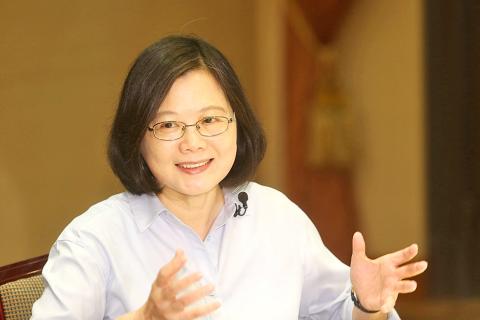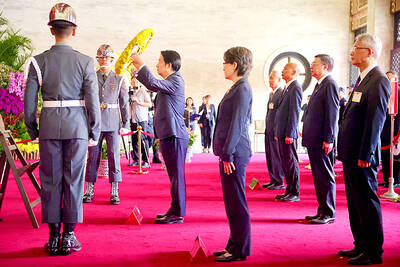President Tsai Ing-wen (蔡英文) has reiterated her proposal that Taipei and Beijing create a new model to handle cross-strait relations, which have been at a standstill since her inauguration in May last year.
Taiwan hopes that both sides can begin to think about the matter after the conclusion of the Chinese Communist Party’s 19th National Congress, at which the party’s new leadership is to be elected, Tsai said in an interview with the Central News Agency published yesterday.
The week-long congress is scheduled to begin on Oct. 18.

Photo: CNA
The two sides of the Taiwan Strait have for many years dealt with their ties based on an established model and guidelines, which to a certain extent have helped maintain cross-strait stability, Tsai said.
However, in view of new international situations, they should consider whether there is a need to examine such old practices and mindsets, she said.
“If we keep sticking to these past practices and ways of thinking, it will probably be very hard for us to deal with the volatile regional situations in Asia,” Tsai said.
Unhappy that Tsai’s government has refused to recognize the so-called “1992 consensus,” Beijing has suspended official dialogue with Taipei since she took office.
The “1992 consensus,” a term former Mainland Affairs Council chairman Su Chi (蘇起) in 2006 admitted making up in 2000, refers to a tacit understanding between the Chinese Nationalist Party (KMT) and the Chinese government that both sides of the Taiwan Strait acknowledge that there is only “one China,” with each side having its own interpretation of what “China” means.
Beijing has insisted that the Tsai administration explicitly accept the “1992 consensus” — which in effect says that Taiwan is part of China — as the political foundation for the continuation of relatively warm relations under her predecessor, former president Ma Ying-jeou (馬英九).
However, Tsai has only been willing to say that she respects the historical fact that cross-strait talks took place and that some understanding was reached.
Both sides have made considerable efforts to maintain cross-strait stability over the past 16 months, Tsai said, but added that on major political issues, “they feel we have not reached their expectations, but we have already shown the utmost goodwill.”
She reiterated that the viewpoints outlined in her inaugural address would remain her principles in dealing with cross-strait ties.
In her inauguration speech, Tsai promised that her administration would work to maintain the existing mechanisms for dialogue and communication across the Taiwan Strait and would conduct cross-strait affairs in accordance with the Republic of China Constitution, the Act Governing Relations Between the People of the Taiwan Area and the Mainland Area (臺灣地區與大陸地區人民關係條例) and other relevant legislation.
She also recognized that “there was joint acknowledgement of setting aside differences to seek common ground” in the 1992 talks between representatives of Taipei and Beijing.
In the interview, Tsai said she did not see Premier William Lai’s (賴清德) comments in open support for Taiwanese independence at the Legislative Yuan on Tuesday last week as affecting cross-strait relations.
Lai is fully aware of the government’s overall policy goals and understands very well “what the limits are,” she said.
Regarding the nation’s military readiness, Tsai said the government would increase its defense spending gradually over the next few years to provide the armed forces with stable financial resources to support efforts to develop a plan to increase the nation’s combat capacity in the next decade.

RESPONSE: The transit sends a message that China’s alignment with other countries would not deter the West from defending freedom of navigation, an academic said Canadian frigate the Ville de Quebec and Australian guided-missile destroyer the Brisbane transited the Taiwan Strait yesterday morning, the first time the two nations have conducted a joint freedom of navigation operation. The Canadian and Australian militaries did not immediately respond to requests for comment. The Ministry of National Defense declined to confirm the passage, saying only that Taiwan’s armed forces had deployed surveillance and reconnaissance assets, along with warships and combat aircraft, to safeguard security across the Strait. The two vessels were observed transiting northward along the eastern side of the Taiwan Strait’s median line, with Japan being their most likely destination,

‘NOT ALONE’: A Taiwan Strait war would disrupt global trade routes, and could spark a worldwide crisis, so a powerful US presence is needed as a deterrence, a US senator said US Senator Deb Fischer on Thursday urged her colleagues in the US Congress to deepen Washington’s cooperation with Taiwan and other Indo-Pacific partners to contain the global security threat from China. Fischer and other lawmakers recently returned from an official trip to the Indo-Pacific region, where they toured US military bases in Hawaii and Guam, and visited leaders, including President William Lai (賴清德). The trip underscored the reality that the world is undergoing turmoil, and maintaining a free and open Indo-Pacific region is crucial to the security interests of the US and its partners, she said. Her visit to Taiwan demonstrated ways the

GLOBAL ISSUE: If China annexes Taiwan, ‘it will not stop its expansion there, as it only becomes stronger and has more force to expand further,’ the president said China’s military and diplomatic expansion is not a sole issue for Taiwan, but one that risks world peace, President William Lai (賴清德) said yesterday, adding that Taiwan would stand with the alliance of democratic countries to preserve peace through deterrence. Lai made the remark in an exclusive interview with the Chinese-language Liberty Times (sister paper of the Taipei Times). “China is strategically pushing forward to change the international order,” Lai said, adding that China established the Asia Infrastructure Investment Bank, launched the Belt and Road Initiative, and pushed for yuan internationalization, because it wants to replace the democratic rules-based international

WAR’S END ANNIVERSARY: ‘Taiwan does not believe in commemorating peace by holding guns,’ the president said on social media after attending a morning ceremony Countries should uphold peace, and promote freedom and democracy, President William Lai (賴清德) said yesterday as Taiwan marked 80 years since the end of World War II and the Second Sino-Japanese War. Lai, Vice President Hsiao Bi-khim (蕭美琴) and other top officials in the morning attended a ceremony at the National Revolutionary Martyrs’ Shrine in Taipei’s Zhongshan District (中山) to honor those who sacrificed their lives in major battles. “Taiwanese are peace-loving. Taiwan does not believe in commemorating peace by holding guns,” Lai wrote on Facebook afterward, apparently to highlight the contrast with the military parade in Beijing marking the same anniversary. “We